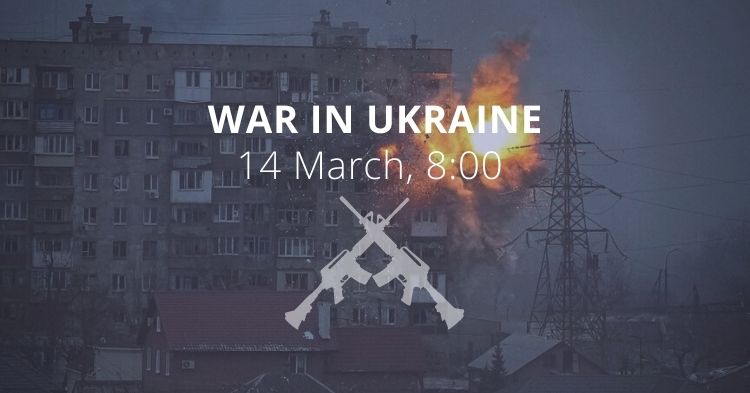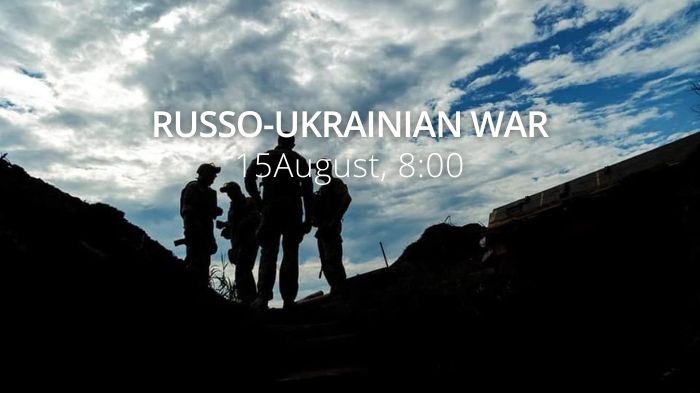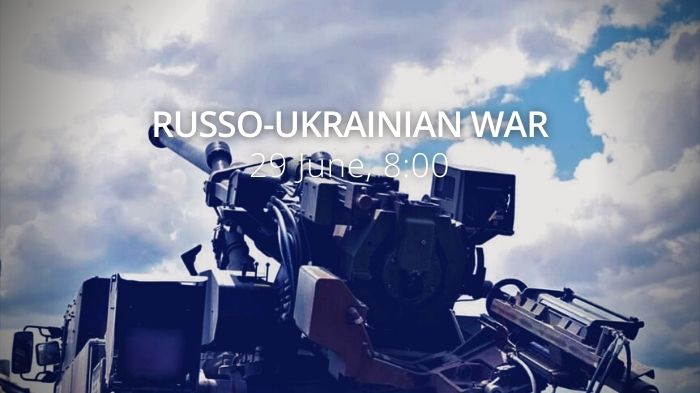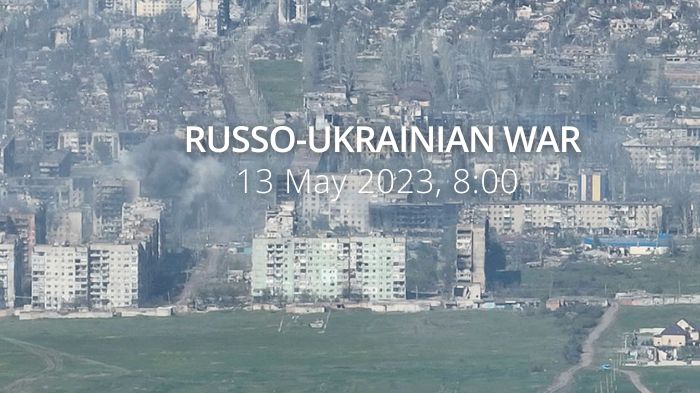Morning report day 19 - March 14
The report is based on media reports, expert analyses and official information posted online.
BTG: Battalion Tactical Group, approximately 600–800 officers and soldiers, of whom roughly 200 are infantrymen, typically equipped with roughly 10 tanks and 40 infantry fighting vehicles.
Situation
According to information from the General Staff as of 06.00 14.03.2022, supplemented by its [midnight assessment]:
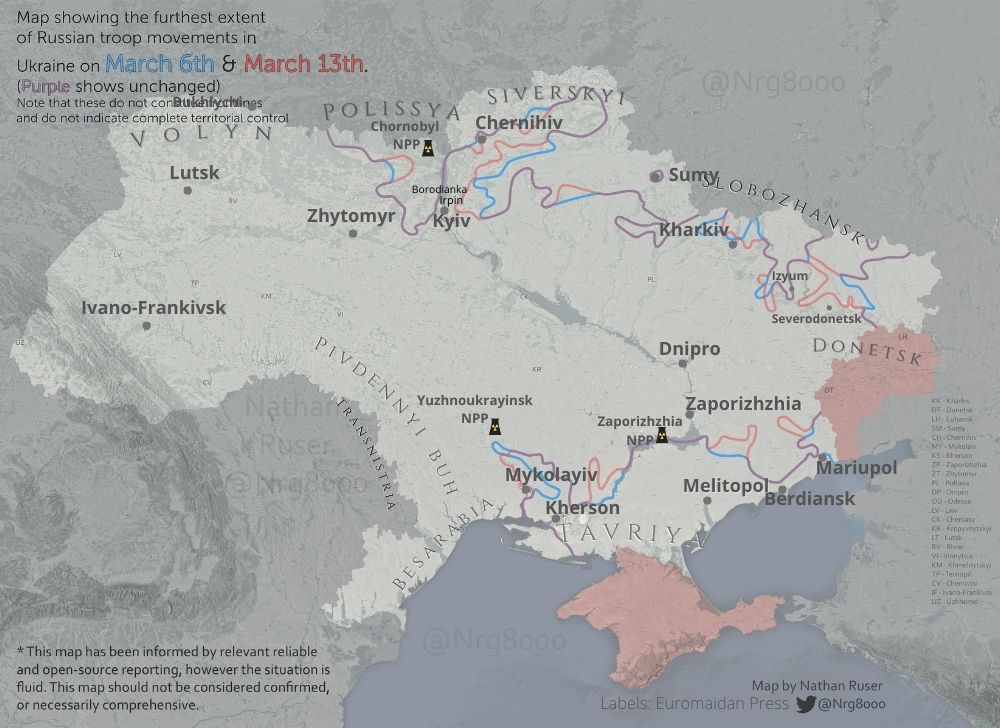
“[Russian occupation forces continue the offensive operation against our state. They are trying to gain a foothold in the occupied positions and maintain the pace of the offensive in certain areas.]
Status, position, and nature of actions of the defense forces are without significant changes.
The Armed Forces of Ukraine inflicted devastating blows on the rear infrastructure (field bases and warehouses) in order to disrupt the system of logistical support of the enemy in the territories of Ukraine temporarily occupied by the occupiers. During the previous day, four planes, three helicopters, and unmanned aerial vehicles were hit by the Air Force of the Armed Forces of Ukraine (information on the type is being clarified).
The occupying forces did not have significant success in conducting an offensive operation in all directions. The main efforts of the occupiers were focused on consolidating and retaining the previously occupied borders.
Repeated cases of the enemy's use of civilian infrastructure, including religious sites to equip firing positions, deploy weapons and military equipment, have been reported.
[In order to increase the number of groups in the Polissya, Tavriya, and Pivdennyi Buh operational areas, the enemy is forming and moving strategic reserves to our borders.]
[In the Volyn direction, the enemy carried out demonstration operations by units of the Armed Forces of the Republic of Belarus along the State Border of Ukraine.]
[In the Polissya direction, units of the occupying forces carried out measures to restore combat capability and regroup troops, and improve logistics. In order to exclude the suddenness of actions by the Armed Forces of Ukraine, the enemy is actively conducting reconnaissance.]
[In the Northern direction, the enemy focused on regrouping, replenishing supplies, preparing to resume the offensive in the direction of Brovary.]
[In the Slobozhansky direction, the enemy is trying to gain a foothold on the achieved frontiers, regrouping troops and trying to resume offensive operations on the cities of Kharkiv and Sumy.]
[In the Izium direction, as a result of active offensive actions
of Ukrainian defenders, the enemy suffered losses in the area of the settlements of Topolske, Shpakivka, Donetsk and retreated.]
[In the Donetsk and Tavriya directions, enemy units are trying to carry out assault operations, concentrating their main efforts on advancing in the direction of Sievierodonetsk.]
[Attempts to capture Mariupol remain unsuccessful.]
[In the Pivdennyi Buh directions, the enemy is trying to conduct raids and gain a foothold on the achieved frontiers.]
[There have been cases of mass refusals by Russian servicemen to "travel to Ukraine" to take part in hostilities, despite promises of "war veteran" status, additional daily allowances, and higher salaries.]
The moral and psychological state of the enemy remains low, which leads to the refusal of servicemen of the Russian Armed Forces to carry out the orders of the command. According to available information, a military camp of the Belgorod Military Commandant's Office is located in the city of Belgorod on the territory of the Russian federation. The camp holds Russian servicemen who have been discharged from hospitals after treatment and are waiting to be sent to units. Also, in the specified camp there are servicemen […} who refuse to take part in hostilities, with the actions of a pre-judicial inquiry being carried out.
Regarding the readiness of the Armed Forces of the Republic of Belarus to wage war with Ukraine. According to one of the high-ranking officials of the special operations forces of the Republic of Belarus, special forces of the Armed Forces of Belarus will not take part in the war with Ukraine.”

According to British Defence Intelligence, (last 24 hours):
- More than 2,500,000 refugees have been forced from their homes as a result of President Putin's attack on Ukraine.
- Indiscriminate Russian shelling and air attacks are causing widespread destruction. The UN has reported that there have already been 1,663 civilian casualties since the Russian invasion began.
- As with previous such estimates, the true figures are likely to be significantly higher and will continue to climb as long as Russian operations continue.
- Russian naval forces have established a distant blockade of Ukraine's Black Sea coast, effectively isolating Ukraine from international maritime trade.
- Russian naval forces are also continuing to conduct missile strikes against targets throughout Ukraine.
- Russia has already conducted one amphibious landing in the Sea of Azov and could look to conduct further such operations in the coming weeks.
As of 14.03.2022 morning, the approximate losses of weapons and military equipment of the Russian Armed Forces from the beginning of the war to the present day:
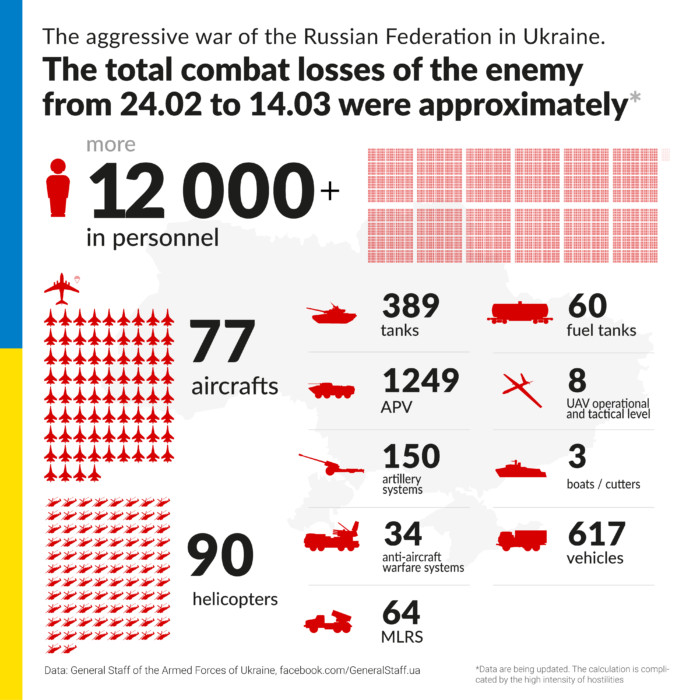
- personnel – more than 12.000 people (no significant change),
- tanks – 389 units (+15),
- armoured combat vehicles – 1249 units (+23),
- artillery systems – 150 (+10),
- multiple rocket launchers – 64 (+2),
- air defence means – 34 (no change),
- aircraft - 77 (+3),
- helicopters - 90 (+4);
- automotive technology – 617 (+17),
- light speedboats - 3 units (no change),
- fuel and lubricant tanks – 60 (no change),
- UAV operational and tactical level – 8 (+1).
Ukraine claims that the Russian Armed Forces shot down one of its own drones Sunday 13 March. The drone was conducting reconnaissance in the Kharkiv direction when it was downed by a “TOR” air-defence missile system.
Humanitarian
According to UNHCR 2,698,280 refugees have been registered as of 12 March.
The UN says that so far Poland has taken in 1,655,503 refugees, Hungary 246,206, Slovakia 195,980, Moldova 104,929, Romania 84,671, Russia 105,897 and Belarus 938. More than 304,156 people have moved on from these countries to others in Europe. The numbers do not seem fully up to date since the number of refugees in Romania has remained unchanged for 4 days. Thousands of refugees from Ukraine are arriving daily by train in Romania, themedialine reports.
Nearly 125,000 people have been evacuated via humanitarian corridors from conflict zones in Ukraine, Ukrainian President Volodymyr Zelenskyy said in a video address on Sunday. On March 14, 10 humanitarian corridors in Kyiv and Luhansk oblasts have been coordinated in Ukraine.
“As millions of women and children flee across Ukraine's borders in the face of Russian aggression, concerns are growing over how to protect the most vulnerable refugees from being targeted by human traffickers or becoming victims of other forms of exploitation”, VOA News reports. "Obviously all the refugees are women and children, said Joung-ah Ghedini-Williams, the UNHCR's head of global communications […]. You have to worry about any potential risks for trafficking — but also exploitation, and sexual exploitation and abuse. These are the kinds of situations that people like traffickers … look to take advantage of," she said.
According to Ukrainska Pravda
the situation in the Oblasts are as follows:
- Kyiv: Two victims were shot at the 9-story building in Obolon (currently known to be dead) and the Antonov plant. Three rockets hit the plant, according to preliminary information, no casualties.
- Mykolayiv Oblast: Russian forces fired on the city of Snihurivka, as a result of which 5 houses were destroyed - six people were rescued from the ruins, one person was killed.
- Zhytomyr Oblast: The administrative buildings in the village were hit. 7 buildings were destroyed and 4 people were injured. The search continues.
- Rivne Oblast: An attack this morning damaged the TV tower and the administrative building.
- Sumy Oblast: Okhtyrka's residential sector was bombed. At least 3 people were killed.
- Chernihiv Oblast: Chernihiv Polytechnic University was shelled. "Uragan" rockets fired at Nizhyn. No losses.
Legal
Since the beginning of the war, on February 24, three journalists have been killed in Ukraine. In total, the Justice for Journalists Foundation has documented at least 35 attacks on media outlets.
51-year-old New York Times correspondent was shot today by Russian invaders in Irpin.
Another journalist was injured.–Chief of Kyiv Oblast National Police informed, 14:00 EET https://t.co/qguMiz6tB6 @nytimesworld pic.twitter.com/15U6UmNN26
— Euromaidan Press (@EuromaidanPress) March 13, 2022
Ignoring the norms of International Humanitarian Law, the Russian occupiers continue to destroy civilian infrastructure in Ukraine, the General Staff of Ukraine reports. Thus, on March 13, missile strikes were carried out on objects in the settlements of Uman, Ivano-Frankivsk, Starychi with the use of strategic aircraft. In addition, the launch of mobile short-range ballistic missile system "Iskander" (SS-26 Stone) from the territory of Belarus continues.
Environmental
“Ukraine informed the International Atomic Energy Agency (IAEA) today that Ukrainian specialist teams had succeeded in repairing a power line needed to resume external electricity supplies to the Chornobyl Nuclear Power Plant (NPP), four days after they were completely lost at the Russian-controlled site, Director General Rafael Mariano Grossi said.
This is a positive development as the Chornobyl NPP has had to rely on emergency diesel generators for several days now, Director General Grossi said. However, I remain gravely concerned about safety and security at Chornobyl and Ukraine’s other nuclear facilities.
[Sunday], the Ukrainian regulator informed the IAEA that staff at the Chornobyl NPP were no longer carrying out repair and maintenance of safety-related equipment, in part due to their physical and psychological fatigue after working non-stop for nearly three weeks.
The staff of 211 technical personnel and guards have still not been able to rotate from the facility since the day before Russian forces entered the site on 24 February, the regulatory authority said, also voicing security concerns about transporting staff outside the Exclusion Zone set up after the accident. The regulator has no direct communication with the staff but receives information from off-site NPP management.
Director-General Grossi said the increasingly dire situation facing personnel at the facility – coupled with persistent issues related to communication from the site as well as the now resolved power supply problem – added further urgency to an IAEA initiative aimed at ensuring safety and security at Ukraine’s nuclear power plants.”
Support
President Joe Biden on Saturday approved $200 million in military aid to Ukraine despite Russia’s warning of possibly attacking arms shipments, Newsweek reports. Reuters reported that the financial assistance would go into additional small arms and anti-tank and anti-aircraft weapons to Ukraine.
“The Czech Republic will send more military aid to Ukraine, its defence minister said on Sunday, while neighbouring Slovakia said it was considering sending an air defence system to the Kyiv government”, Reuters reports. “Czech Defence Minister Jana Cernochova said her country, a NATO member, had already sent at least 725 million crowns ($31.55 million) worth of military gear. “I think that we will at least double that,” she said during a television debate.”
More medical supplies left the UK today for Poland. The UK is providing £220m in humanitarian aid to respond to the deteriorating situation in Ukraine.
New developments
- The United States and China will hold talks on Russia’s attack on Ukraine, korrespondent.net reports. The parties will discuss ongoing efforts to resolve competition between our two countries and discuss the impact of Russia’s war against Ukraine on regional and global security.
- Russia says there has been 'substantial progress in peace talks and 'joint position' could be reached soon, Sky News reports. The possible breakthrough comes after Ukrainian negotiator and presidential adviser Mykhailo Podoliak said he thought progress could be made in the talks with Russia in a "matter of days".
- The fourth round of Ukraine-Russia peace talks is underway.
The fourth round of Russia-Ukraine talks are underway, having started 10.30 EET via video link.
Prez Office advisor says Ukraine demands ceasefire, full withdrawal of troops, security guarantees; later makes update that there is "discord" https://t.co/GR7ZSlHlMm
— Euromaidan Press (@EuromaidanPress) March 14, 2022
- Russia has asked China for military and economic aid for its war in Ukraine, US media reported Sunday, hours after the White House warned Beijing would face severe “consequences” if it helps Moscow evade sanctions, VOA News reports.
- Pope Francis on Sunday rejected Russia's use of the term "special military operation" for its invasion of Ukraine, saying the country was being battered by war and urging an immediate end to the fighting, Reuter reports.
"In Ukraine, rivers of blood and tears are flowing. This is not just a military operation but a war which sows death, destruction and misery, the pope said in his weekly address to crowds gathered in St. Peter's Square.”
Assessment
1. The War
The Institute for the Study of War has made the following assessment as of Sunday 22:00 (Kyiv time):
Key Takeaways
- Russian forces did not conduct offensive operations northwest of Kyiv for the third day in a row.
- Russian forces did not conduct attacks toward northeastern Kyiv and prioritized reinforcing their lines of communication and logistics routes.
- Russian and proxy forces successfully captured several towns north of Mariupol in Donetsk Oblast on March 13, the only offensive ground action of the day.
- Ukrainian protests in occupied Kherson are likely expanding.
- Russia is diluting its international deployments in Armenia and Nagorno-Karabakh to reinforce operations in Ukraine and pulling additional forces from Russia’s far east.
- Ukrainian intelligence reported Russia will deploy preexisting pro-Assad Syrian units to Ukraine, in addition to previously announced plans to recruit new Syrian and Libyan mercenaries. These forces are unlikely to enable Russia to favourably change the balance of forces around Kyiv in the next week but may provide a longer-term pool of low-quality replacements.
- Russian ballistic missiles killed 35 Ukrainians at the Yavoriv military training centre near Poland in a likely effort to interdict Western aid deliveries to Ukraine—following up on the Kremlin’s March 12 announcement it will treat international aid shipments as military targets.”
2. We must resist a "Third Minsk Agreement" at all costs
President Putin’s “Minsk Agreement Strategy” allowed him to maintain a low-intensity hybrid war against Ukraine for 8 years. More importantly, the faint hope of a political solution it provided helped him ensure that the West did not properly engage in Ukraine. NATO and the EU committed to the Russian mantra of a “peaceful resolution” to the conflict and, therefore, denied Ukraine the defense aid it needed to deter the full-scale war that ensued.
The USA only started delivering defensive weapons only in 2018. Europe started delivering defense aid as war became inevitable.
The argument from the West was that an inflow of weapons would fuel the conflict. Doing so, we inadvertently ensured that the victim of the Russian aggressions remained weak, while the aggressor continued to modernize and strengthen its armed forces, relocate forces close to the Ukrainian border, and little by little, increase its control over Belarus.
The Western arguments ran counter to the main purpose of Armed Forces in all democratic countries: to deter aggressions and when deterrence fails, to fight for the sovereignty and territorial integrity of the country.
Putin’s “Minsk Agreement Strategy” will be used again. We are already hearing promises of a peaceful resolution to the war from the Kremlin. Its strategic signaling occurs as Russia is bringing in fresh forces from both across the country as well as mercenaries from the Middle East, improving logistics of the forces already in place, remaining poised for an amphibious landing along the Black Sea coast, and preparing for the next phase of the war.
The question is: Will the West look away one more time or will it maintain its determination to force Russia out of Ukraine and if needed, bring it to its knees until President Putin is president no more?
3. “The Red Line”
The New Yorker yesterday published an excellent piece by Philip Gourevitch called “Is It Time to Call Putin’s War in Ukraine Genocide?”
“We have to call this what it is, Volodymyr Zelensky said, late last month, a few days after Vladimir Putin had ordered the invasion and conquest of Ukraine. Russia’s criminal actions against Ukraine show signs of genocide.”
“And by the end of the invasion’s second week—with Putin’s indiscriminate bombardment of civilian targets intensifying, and the death toll mounting rapidly; with more than two and a half million Ukrainians having fled the country, and millions more under relentless attack in besieged cities and towns; and with no end in sight—Zelensky no longer deferred to outside experts to describe what Ukrainians face in the most absolute terms. “I will appeal directly to the nations of the world if the leaders of the world do not make every effort to stop this war,” he said in a video message on Tuesday. He paused, and looking directly into the camera, added, “This genocide.”
“Genocide, the word and the idea, is colloquially understood to describe an effort to exterminate members of a definable identity group through targeted killings. […] But, in international law, genocide has nothing explicitly to do with the enormity of criminal acts. Rather, according to the 1948 United Nations Convention on the Prevention and Punishment of the Crime of Genocide, it is defined by the enormity of criminal intent […].”
“By this standard, Putin’s war of obliteration comes readily into focus as genocidal, if not—to date, anyway—as comprehensive genocide. His apparent objective is to extinguish Ukraine as an independent nation, and to subsume it and its surviving population into Russia, where he claims it naturally belongs.”
“In announcing the start of the war, Putin spoke dismissively of Ukraine as a historical fiction, denying its sovereign existence, and portrayed his invasion, absurdly, as a sort of humanitarian mission to “de-Nazify” the place, to protect its people from humiliation and genocide at the hands of their own popularly elected leaders, and to bring those leaders to trial.
Putin’s world-upside-down framing treated questions of genocide and war crimes, as well as of democracy and accountability, as make-believe, and therefore ridiculous; and it gave off a strong whiff of the propaganda tactic known as “accusation in a mirror,” in which a speaker accuses his prospective victims of plotting to do to him what he is plotting to do them. As Jen Psaki, the White House press secretary, recently tweeted, Russia has a track record of accusing the West of the very violations that Russia itself is perpetrating.
Zelensky put it more succinctly: If you want to know what Russia is planning, look at what Russia is accusing others of planning.”
“[…] the prospect of Russian glory looks as diminished as the exchange rate of the ruble. That increases the risk of genocidal atrocities. Putin has no apparent exit strategy; and the worse the war has gone for him, the worse he has made it for Ukraine, raining hellfire on its civilian infrastructure, in what appears to be a determination to reduce it, as his forces previously did in parts of Chechnya and Syria, to lifeless rubble. By his own account, Putin’s fight is, above all, against humiliation, and that is a fight he’s losing badly. […]”
“If the world stands aloof, it will lose itself. Forever, Zelensky said, on Tuesday. “Because there are unconditional values. The same for everyone. First of all, this is life. The right to life for everyone. Then, on Wednesday, after Russia bombed a maternity hospital in Mariupol, he asked, “How much longer will the world be an accomplice ignoring terror? Close the sky right now!”
The Russian occupiers have killed 2187 Ukrainian civilians in Mariupol.
During 24 days of the siege of Mariupol, they dropped over 100 air bombs - city administration. Russian tanks and MRLS continue to shell the city.
Photo: Evgeniy Maloletka/instagram#CloseTheSky pic.twitter.com/ZD2A1PwHqz
— Euromaidan Press (@EuromaidanPress) March 14, 2022
Admittingly, I left out the fears many voices:
“The war is only in its third week, and [President Putin] has repeatedly signaled that he is prepared to use his nuclear arsenal, a threat so grave from a man so given to the use of annihilating force that it would be a folly to assume that he’s bluffing.”
My reason for doing so goes to the core challenge: If we accept the Russian “fait accompli strategy” enforced through nuclear blackmail, we have already lost the world we are living in. It will only encourage Russia to continue its aggressive foreign policy.
Additionally, it is not remotely possible to imagine any situation where Russia willingly and knowingly sees WW3 and our mutual destruction as a beneficial scenario. Russia is a country in constant war. While it might be utterly unscrupulous and immoral, it is not senseless.
Fear is understandable, but not necessarily rational.
Today we need rationality, courage, and resolve.

